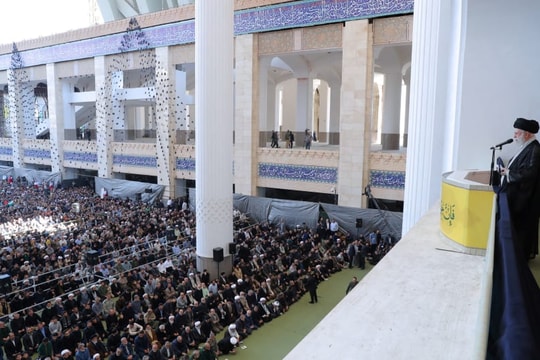Israel bombs Lebanon, Gaza Strip ahead of first anniversary of October 7 attacks
Israel bombed targets in Lebanon and the Gaza Strip on October 6 ahead of the first anniversary of the October 7 attack that sparked its war.
Israeli airstrikes hit the southern suburbs of Beirut, Lebanon on October 6, the heaviest bombing of the Lebanese capital since Israel sharply intensified its campaign against the Iran-backed Hezbollah group last month. Huge fireballs lit up the dark skyline and explosions echoed across Beirut.
The Israeli military said warplanes struck targets in Beirut belonging to Hezbollah's intelligence headquarters and weapons storage facilities. It said air strikes also targeted Hezbollah in southern Lebanon and the Beqaa region.

Meanwhile, according to Israeli police, Hezbollah rockets launched late on October 6 evaded Israeli air defenses and landed on Haifa, Israel's third-largest city, causing damage to buildings. Israeli media reported that 10 people were injured in the rocket attacks in Haifa and the city of Tiberias.
Hezbollah said it targeted a military site south of Haifa with a barrage of "Fadi 1" missiles.
Last week, Iran launched a missile attack on Israel in response to its activities in Lebanon and Gaza, where Hezbollah and Hamas militants are allies of Tehran in the so-called Axis of Resistance.
Israeli Defense Minister Yoav Gallant said on October 6 that Israel will decide for itself how to deal with Iran, although it is coordinating closely with its long-time ally, the United States.
"Anything is possible," Yoav Gallant, who will meet with US Defense Secretary Lloyd Austin on October 9, said in an interview with CNN. "Israel has the ability to strike targets near and far, we have proven that."
While the US has said it will not support attacks on Iran's nuclear facilities, President Joe Biden said last week that Israeli strikes on Iranian oil facilities are being discussed.
Israel has ignored US-backed ceasefire efforts as it launches ground operations in Lebanon.
On October 6, the US government responded to Israel's heavy bombing there by saying that military pressure could facilitate diplomacy but could also lead to miscalculation.
French President Emmanuel Macron said at the weekend that arms shipments to Israel should be halted, but Israel said such a move would serve Iran's purposes.
The Israeli military issued a new evacuation order for residents south of Beirut on the night of October 6 ahead of further airstrikes. Also on the night of October 6, Israel announced the closure of three more areas on its northern border, in addition to more than five areas closed last week as military staging areas.
An Israeli airstrike on a building in the mountain town of Kayfoun in central Lebanon killed six people and wounded 13, Lebanon's Health Ministry said. An airstrike in the nearby town of Qmatiye killed six more people, including three children, and wounded 11.
In the Gaza Strip, at least 26 people were killed and 93 others were injured when Israeli airstrikes hit a mosque and a school where displaced people were sheltering on October 6, according to the media office of the Hamas-run Gaza administration.
The Israeli military said it carried out "precision strikes on Hamas terrorists".
Iran also cited assassinations of militant leaders in its attack on Israel last week, which have damaged Hezbollah's senior ranks. Hezbollah leader Hashem Safieddine was targeted by an Israeli airstrike in southern Beirut last week and his fate remains unclear. He was seen as a possible successor to leader Sayyed Hassan Nasrallah, who was killed in an Israeli strike last month.
Senior Hezbollah political official Mahmoud Qmati told Iraqi state television on October 6 that Israeli bombing was hampering search efforts in an area where Safieddine was believed to have been targeted. He said Hezbollah was being led by a joint command until a leader was appointed.
Two senior Iranian security officials told Reuters that Iran's Quds Force commander Esmail Qaani had also not been heard from since the Israeli air strike on Beirut last weekend.
The conflict in Lebanon, which began a year ago with cross-border attacks by Hezbollah in solidarity with Hamas, has rapidly escalated in recent weeks.
More than 2,000 people have been killed in Lebanon in nearly a year of fighting, most of them in the past two weeks, according to the Lebanese Health Ministry. The ministry said on October 6 that 25 people were killed on October 5.
"Last night was the most violent of all the previous nights," said Hanan Abdullah, a resident of the southern suburbs of Lebanon's capital Beirut. "There were dozens of attacks, we couldn't count them all."
The head of the UN refugee agency said on October 6 that there were “multiple instances” of Israeli air strikes violating international law by hitting civilian infrastructure and killing civilians in Lebanon.
However, Israel said it targeted military targets and took steps to minimize the risk of harm to civilians, while Lebanese authorities said civilians were targeted.





